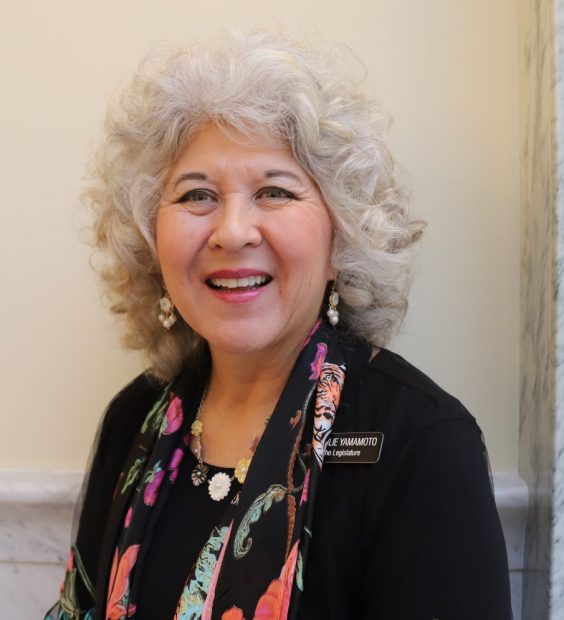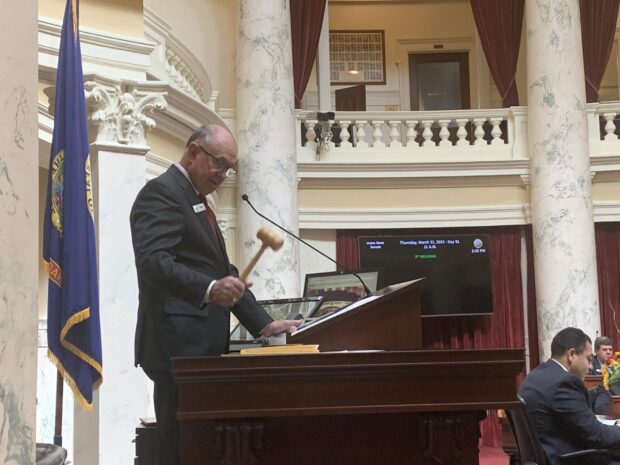(UPDATED, 9:56 a.m. Thursday, to correct the four counties that comprise legislative District 8.)
Tuesday’s Republican legislative primaries delivered as promised.
They were turbulent.
Fifteen incumbents lost — including, in what could be a historic primary upset, Senate President Pro Tem Chuck Winder.
The House and Senate caucuses appear poised to shift further to the right, thanks in large part to a series of upsets in the Magic Valley.
Outside PAC money made the primaries more costly and more caustic. Even so, the big spenders’ success rate was mixed, as some negative campaigns fizzled out.
There’s a lot to process.
And it picks up where we left off in 2022, with Statehouse turnover.
Two years ago, the primaries claimed 20 GOP incumbents — a purge that seemed like a fluke, compared to previous election cycles. Tuesday’s turnover didn’t quite reach that level, but it was still dramatic.

One upset could have a profound impact on education policy. Rep. Julie Yamamoto, R-Caldwell, a retired teacher and administrator, brought a moderate and unapologetically pro-public school mindset to her job as House Education Committee chair. As a result, her committee was frequently bypassed, as House leadership routed school choice and library bills to other committees. Yamamoto lost Tuesday to a challenger to her right, Kent Marmon of Caldwell.
A fellow moderate, Vice Chair Lori McCann, R-Lewiston, narrowly won her own primary Tuesday, and stands next in line to head House Education. But House leadership isn’t obligated to promote a vice chair. The only guarantee here is turnover — which could prove to be minor, or major.
Winder’s ouster was Tuesday’s biggest upset. Winder, R-Boise, had served 16 years in the Senate, 14 of them in some spot in GOP leadership. His loss to a relative unknown, Meridian Republican Josh Keyser, isn’t completely unprecedented. In 1988, then-Senate President Pro Tem Jim Risch lost in the general election to Boise Democrat Mike Burkett. But it’s another matter — and perhaps unprecedented — for the Senate’s top leader to lose in a party primary.

Winder’s departure creates a vacuum at the top of Senate leadership, and sets up a showdown between the Senate’s mainstream GOP faction and its rising hardline faction.
Hardliners are poised to gain seats in the Senate GOP caucus. Two Senate hardliners lost Tuesday: first-term Sens. Scott Herndon of Sagle and Chris Trakel of Caldwell. But barring any upsets in November’s general election, four new or returning hardliners could join the Senate: Keyser, Brandon Shippy of New Plymouth, Joshua Kohl of Twin Falls and former Sen. Christy Zito of Hammett.
The Senate GOP caucus — sharply split when Winder was re-elected pro tem in 2022 — could be more deeply divided now.
Hardliners also made gains in the House, even after losing incumbents like Reps. Jacyn Gallagher, R-Weiser, and Julianne Young, R-Blackfoot.
It’s also significant to note where the headliners picked up ground and unseated moderate incumbents.
Kohl led a conservative surge in Twin Falls County — a reliably Republican stronghold that has long favored mainstream to center-right candidates.
Zito headed up a hardline sweep in sprawling legislative District 8, which takes in Elmore, Boise, Valley and Custer counties. All three of District 8’s incumbents lost, including Rep. Matt Bundy of Mountain Home, a high school teacher who served on the Joint Finance-Appropriations Committee, and Rep. Megan Blanksma of Hammett, a fervent backer of the Idaho Launch postsecondary grant program.
The turnover — and the Legislature’s potential shift to the right — came after a torrent of independent campaign spending. And, arguably, despite the torrent of independent spending.
None of the big-dollar PACs ran the table Tuesday, and several had a downright spotty night:
- The Idaho Liberty PAC — backed by mainstream business groups that are closely tied to Gov. Brad Little — put most of their $941,000 into negative messaging against four first-term Senate hardliners. Only one of their primary targets lost: Trakel.
- Make Liberty Win, aligned with Texas-based Young Americans for Liberty, spent $656,000, and directed almost $110,000 at a big-money blitzkrieg at House Speaker Mike Moyle. Several of the group’s other key targets also survived Tuesday’s primary. The group did spend $104,000 targeting Winder, and the money had to be a factor at some level. But Winder had already accumulated baggage, partly because of his own battles with senators of his own party.
- The Idaho Federation for Children PAC fared reasonably well with its $303,000. The group used much of its money getting retribution against first-term Reps. Melissa Durrant of Kuna and Kenny Wroten of Nampa, who opposed a private school tuition tax credit bill. The group also rewarded two school choice supporters, Rep. Wendy Horman, R-Idaho Falls, and Sen. Julie VanOrden, R-Pingree. The group missed on two other races, including the Winder race.
- Right 2 Learn, an anti-school choice group funded largely by the Idaho Education Association, spent nearly $130,000 and whiffed on its big race. Right 2 Learn spent close to $77,000 targeting Horman, JFAC’s powerful co-chair, and supporting one of Horman’s opponents, Ammon Mayor Sean Coletti, a school choice critic.
In all, state elections officials have seen at least a $2 million surge in outside spending this year — for a midterm primary without any statewide races. “We just have never experienced this kind of outside money coming in,” Secretary of State Phil McGrane said Tuesday.
Whether that spree continues might depend on whether outside groups get what they consider an adequate return on a speculative investment. Do they get enough for their money, ousting or promoting some candidates while wagering on some races that become lost causes?
Regardless, the outside spending fed into a brutish primary campaign. The messaging was long on negativity, short on nuance. But that also fit in with races where many candidates fell neatly into mainstream and hardline camps, without a lot of gray area on the issues.
The end result: a string of legislative primaries that felt less like retail elections and more like miniature congressional races.
If that’s the way of the future, expect more big spending, an ongoing fight over the GOP’s balance of power — and more turnover and turmoil.
Kevin Richert writes a weekly analysis on education policy and education politics. Look for his stories each Thursday. Due to the timeliness of the topic, this week’s analysis was published on Wednesday, May 22.
